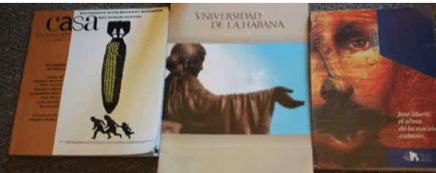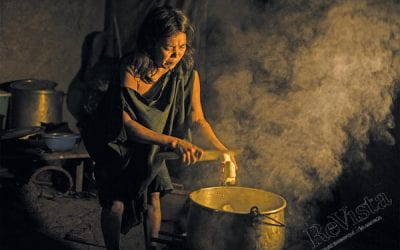Building Bridges with Cuban Libraries
Since the beginning of the U.S. trade embargo on Cuba in the 1960s, the Harvard Libraries have been unable to purchase materials directly from Cuban institutions, publishers or booksellers. We rely chiefly on vendors from third-party countries—for example Uruguay, Canada and Spain—who make regular purchasing trips for U.S. libraries. In recent years, several small U.S.-based vendors have been able to do so as well.
We encourage Harvard students on semester-long Study Abroad trips (Harvard has sent students to Cuba on an exchange with the University of Havana since Spring 2007) to bring back books, posters and other materials to donate to the university libraries. Faculty members who travel to the island and visiting Cuban researchers often collaborate as well.
As the librarian for Latin America, Spain and Portugal at the Harvard Library (Widener), I took advantage of a recent trip to Cuba to renew ties and agreements for academic resource-sharing with administrators and librarians at Cuba’s leading research institutions.
The Cuban government subsidizes the great majority of academic publications on the island. That means that many of those materials are not available commercially: thus personal contacts among institutional staff remain paramount. The Biblioteca Nacional de Cuba José Martí and the libraries of the Universidad de La Habana and the Casa de Las Américas (research institute) all publish essential materials on Cuban history, politics, economics, culture and education that are only available through exchange or as gifts (Cuban institutions are very generous)! I met with representatives of all three institutions and returned with a suitcase full of books, publication catalogues, and renewed connections that should serve Harvard Library’s users well.
Of course, researchers of Cuba require collections of non-academic materials as well. Several large U.S. research libraries, including Harvard’s, collect posters, printed ephemera, postcards, photographs and film. Artists’ books are particularly interesting: Ediciones La Vigía of Matanzas has a long history of fabricating works-of-art-including-text (or vice versa) using artisanal and low-cost techniques such as mimeograph and Xerox, as well as staples, brown paper and found objects. Their recent publication Pescador de eneros (2015), by Rey Montalvo, is printed on brown craft paper and hand-bound in cardboard that has a white string netting and pieces of blue colored fabric affixed to it. The cover, which is made to look like a variation of the Cuban flag, also displays the image of a guitar and the black silhouette of a man playing the guitar. The Casa Editora Cuadernos Papiro (Holguín) also publishes artists’ books like Orishas en Cuba, a portfolio containing six booklets with legends of Afro-Cuban deities, printed on paper made of recycled fibers, and annotated: “Para hacer el papel de este libro no se dañó la naturaleza. Se utilizó papel reciclado blanco incorporándole fibras de tabaco. ” (“This book’s paper was made without damaging nature. It uses recycled white paper that incorporates tobacco fiber.”)
We will continue to rely on a mixture of personally coordinated exchanges and out-of- country vendors to obtain Cuban materials until a true economic opening between the two countries is achieved. Complete freedom to purchase and exchange library materials through direct commercial entities would most likely involve the lifting of the U.S. embargo, which must be authorized by the U.S. Congress.
In the meantime, I have begun conversations with publishers and potential vendors in Cuba in preparation for such a change. Scholarly journals are beginning to be published and accessible online (Revista de la Biblioteca Nacional de Cuba José Martí; Temas), but print monographs continue to be elusive, fragile and time-consuming to obtain. Our goal is to make the best Cuban research available to our users in a timely fashion—for this we need open economic relations and a developed book trade. Cooperation with our Cuban colleagues remains crucial during this time of change.
Fall 2015, Volume XV, Number 1
Lynn M. Shirey is the Librarian for Latin America, Spain and Portugal at the Harvard Library (Widener).
Related Articles
Energy: Editor’s Letter
I was waiting for the ship to come in. In fact, so was everyone else in Nicaragua. Gas lines stretched around the block. The supermarket shelves were nearly bare. Lights went out again and again, plunging the country into frequent darkness…
Peruvian Oil Production
English + Español
The petroleum sector I know best is Peru’s, where I recently served as Minister of Energy and Mines. Because of the recent drop in prices, oil-producing…
In the Shadows of the Extractive Industry
English + Español
A telltale detail gave away the changing way of life for the indigenous Machiguenga women living around Peru’s most important gas project in the…





